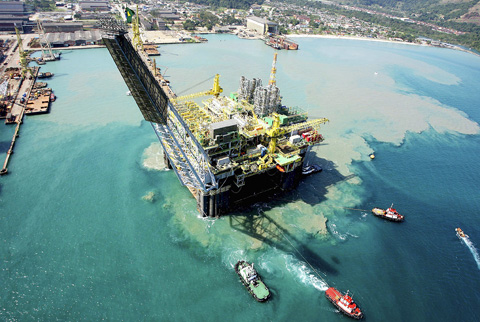Crude oil futures surged to a new trading record of US$117 a barrel on Friday following an attack on a key pipeline in Nigeria, capping a week of record highs fueled by supply woes and the US dollar’s weakness relative to other major currencies. Gasoline futures also reached new record highs.
Light, sweet crude for May delivery spiked to a new trading record of US$117 in after-hours electronic trading on Friday after settling at US$116.69 per barrel on the New York Mercantile Exchange, up US$1.83 over Thursday’s settlement. It was the fifth day in a row crude prices set new records.
The run-up came after the Movement for the Emancipation of the Niger Delta — the main militant group in Nigeria’s restive south — said it had sabotaged a major oil pipeline operated by a Royal Dutch Shell PLC joint venture. The group promised further attacks on the petroleum industry in Africa’s largest producer of crude oil.

PHOTO: AP
A spokeswoman for Shell confirmed that the pipeline was leaking, and said the damage appeared to have been caused by explosives.
The contract had fallen to close to US$113 per barrel in overnight electronic trading as the US dollar strengthened against the euro and other currencies, encouraging some traders to lock in profits from crude recent record run.
In London, Brent crude futures rose US$1.49 to settle at US$113.92 on the ICE Futures exchange.
A host of supply and demand concerns in the US and abroad, along with the dollar’s weakness, have served to support prices, even as record retail gasoline prices in the US appear to be dampening demand. Crude prices have risen as much as 4 percent this week.
“Any kind of geopolitical tension is going to pump up the market,” Mark Waggoner, president of Excel Futures in Huntington Beach, California, told Dow Jones Newswires.
Attacks since early 2006 on Nigerian oil infrastructure by the group have cut nearly one-quarter of the country’s normal petroleum output, boosting oil prices. Nigeria is a major supplier of oil to the US.
Earlier in the trading session Friday, oil’s gains on Friday were limited by the dollar, which strengthened against the euro.
A stronger dollar makes commodities such as oil less attractive to investors as a hedge against inflation, and it makes oil more expensive to investors overseas. Analysts believe the weaker dollar is the primary reason oil has soared well past US$100 a barrel this year. But the effect tends to reverse when the greenback gains ground.
Analysts expect the US Federal Reserve to cut interest rates several more times this year — moves that tend to further weaken the dollar — and reason that those cuts will help propel oil to new records.
Surging crude prices have also boosted retail gasoline prices in the US ahead of the Northern Hemisphere’s summer driving season when prices — and demand — typically increase.
“I would say that energy prices are having the most profound effect on the economy in recent memory,” Phil Flynn, an analyst at Alaron Trading Corp in Chicago, said in a research note.

Rainfall is expected to become more widespread and persistent across central and southern Taiwan over the next few days, with the effects of the weather patterns becoming most prominent between last night and tomorrow, the Central Weather Administration (CWA) said yesterday. Independent meteorologist Daniel Wu (吳德榮) said that based on the latest forecast models of the combination of a low-pressure system and southwesterly winds, rainfall and flooding are expected to continue in central and southern Taiwan from today to Sunday. The CWA also warned of flash floods, thunder and lightning, and strong gusts in these areas, as well as landslides and fallen

WAITING GAME: The US has so far only offered a ‘best rate tariff,’ which officials assume is about 15 percent, the same as Japan, a person familiar with the matter said Taiwan and the US have completed “technical consultations” regarding tariffs and a finalized rate is expected to be released soon, Executive Yuan spokeswoman Michelle Lee (李慧芝) told a news conference yesterday, as a 90-day pause on US President Donald Trump’s “reciprocal” tariffs is set to expire today. The two countries have reached a “certain degree of consensus” on issues such as tariffs, nontariff trade barriers, trade facilitation, supply chain resilience and economic security, Lee said. They also discussed opportunities for cooperation, investment and procurement, she said. A joint statement is still being negotiated and would be released once the US government has made

SOUTH CHINA SEA? The Philippine president spoke of adding more classrooms and power plants, while skipping tensions with China over disputed areas Philippine President Ferdinand Marcos Jr yesterday blasted “useless and crumbling” flood control projects in a state of the nation address that focused on domestic issues after a months-long feud with his vice president. Addressing a joint session of congress after days of rain that left at least 31 dead, Marcos repeated his recent warning that the nation faced a climate change-driven “new normal,” while pledging to investigate publicly funded projects that had failed. “Let’s not pretend, the people know that these projects can breed corruption. Kickbacks ... for the boys,” he said, citing houses that were “swept away” by the floods. “Someone has

‘CRUDE’: The potential countermeasure is in response to South Africa renaming Taiwan’s representative offices and the insistence that it move out of Pretoria Taiwan is considering banning exports of semiconductors to South Africa after the latter unilaterally downgraded and changed the names of Taiwan’s two representative offices, the Ministry of Foreign Affairs (MOFA) said yesterday. On Monday last week, the South African Department of International Relations and Cooperation unilaterally released a statement saying that, as of April 1, the Taipei Liaison Offices in Pretoria and Cape Town had been renamed the “Taipei Commercial Office in Johannesburg” and the “Taipei Commercial Office in Cape Town.” Citing UN General Assembly Resolution 2758, it said that South Africa “recognizes the People’s Republic of China (PRC) as the sole